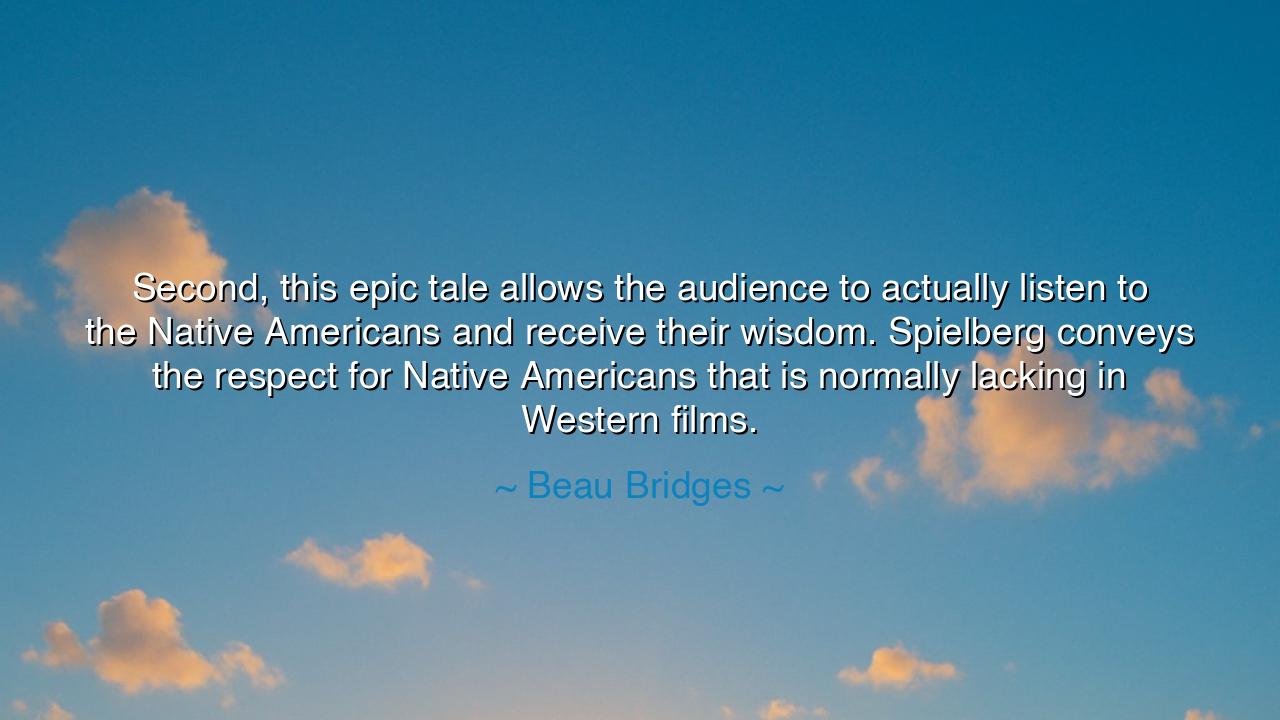
Second, this epic tale allows the audience to actually listen to
Second, this epic tale allows the audience to actually listen to the Native Americans and receive their wisdom. Spielberg conveys the respect for Native Americans that is normally lacking in Western films.






Hearken, children of the ages, to the reflective words of Beau Bridges, who observed: “Second, this epic tale allows the audience to actually listen to the Native Americans and receive their wisdom. Spielberg conveys the respect for Native Americans that is normally lacking in Western films.” In these words lies the eternal truth of reverence, listening, and the power of representation. To hear the voices of those often silenced or misrepresented is to gain insight, to partake in the living wisdom of a people, and to honor the depth of their experience and culture.
Bridges teaches that true understanding arises through attention and respect. The story conveys more than mere events; it conveys values, philosophy, and the intimate connection of a people to the land, to community, and to history. By allowing the Native Americans’ voices to guide the narrative, Spielberg imparts the lesson that wisdom is not granted solely through conquest or spectacle, but through the humility to listen and learn from others.
Consider the historical example of Squanto and the Pilgrims, whose knowledge of agriculture and the land was essential to the survival of early settlers. Yet this wisdom was often overlooked or misunderstood in the retelling of history. In listening attentively, the Pilgrims gained life-saving guidance, showing that the transmission of wisdom across cultures relies on respect, attention, and the recognition of inherent knowledge in others. Bridges’ reflection celebrates this principle in the medium of storytelling.
The ancients themselves recognized the necessity of hearing those who hold ancestral knowledge. Greek philosophers sought counsel from elders; Confucian scholars emphasized the guidance of those rooted in tradition. Spielberg’s approach echoes this timeless insight: narrative and art can serve as vessels through which the voices of the wise and often marginalized are honored and transmitted, ensuring their lessons endure.
Thus, Bridges’ observation is both commendation and exhortation: respect the wisdom of all peoples, and allow their voices to shape your understanding of the world. To listen is to acknowledge that insight and virtue are dispersed, and that even those whose stories have been suppressed carry truths vital to the flourishing of humanity. Representation and reverence are therefore moral acts, enriching both audience and storyteller.
Carry this teaching, children of generations yet unborn: seek out the voices often unheard, honor the wisdom they bear, and recognize that the path to knowledge and understanding is paved by the humility to listen and learn. In doing so, you uphold justice, deepen insight, and allow the enduring lessons of all peoples to guide the course of human thought and conscience.






NMNguyen My
This comment makes me think about audience responsibility. If Spielberg’s film allows us to ‘listen’ to Native Americans, are viewers actually ready to hear what’s being said? Sometimes films offer wisdom or critique, but audiences interpret them through familiar stereotypes. Does the quote imply that understanding requires empathy as well as exposure? I’m curious whether the film inspires cultural learning or just emotional appreciation without real-world awareness.
NQChi Nguyen Quynh
It’s powerful to suggest that a filmmaker can change how we perceive an entire group of people, but I wonder about the limits of that power. Can a single film meaningfully challenge decades of stereotyping in the Western genre? Or does it risk being tokenistic, using a few ‘wise Native’ tropes to signal respect without engaging deeper social realities? I’d like to see how this film measures up over time in that regard.
NNNgoc Nguyen
I like the notion that the audience is encouraged to listen rather than just watch. But how is that achieved cinematically? Is it through silence, music, dialogue, or character development? I’d love to hear more about how Spielberg structured these moments to make the audience receptive instead of passive. Does the film really invite reflection, or does it just romanticize Native Americans in a way that feels comfortable for Western viewers?
JKJulie Kim
This statement makes me curious about the role of storytelling ethics in film. When a director ‘conveys respect,’ what does that actually look like in practice—through character depth, dialogue, or visual symbolism? Is respect shown by accuracy, empathy, or collaboration? I’m also wondering whether the film made an effort to consult Native historians or communities, or if the ‘respect’ was more interpretive and artistic than cultural.
NPchi nguyen phuong
As a viewer, I appreciate the intention to give space to Native American wisdom, but I’m skeptical about whether mainstream cinema can ever fully escape its own biases. Can a non-Native director like Spielberg truly understand and convey Indigenous perspectives without appropriation or misinterpretation? I’d love to know how Native audiences responded—did they feel seen, or did it still feel like someone else telling their story?